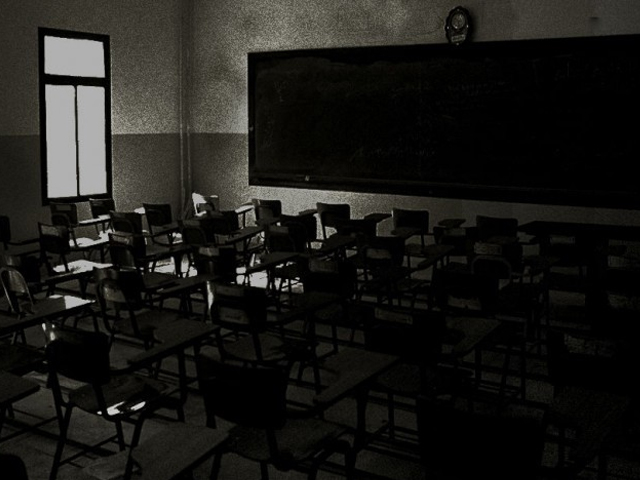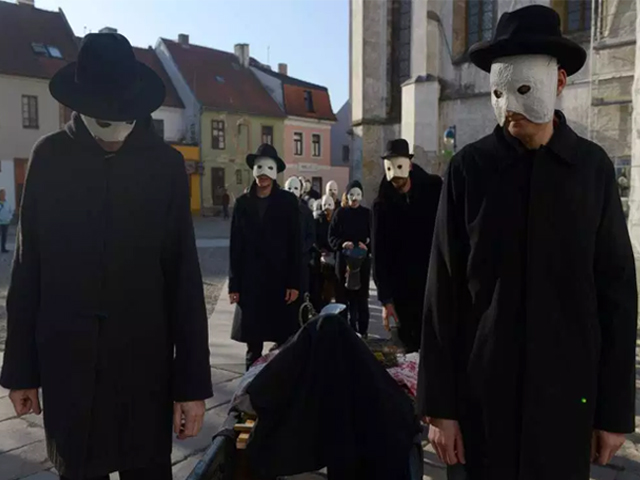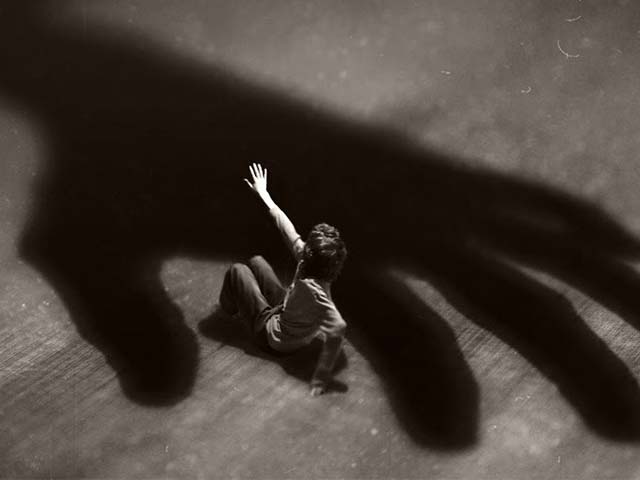
Series 1: “Dreams of Lunacy” Part 5 Stroke of darkness
The lunatic cries. He cries not out of grief for the old man, but how foreign death has become.
He sits with his feet on top of each other, touching the skin just behind the nails where the tips of his fingers feel the small hairs that have recently grown out of nowhere. He rests his head on the strong shoulders of his father and looks at his hands work on the 12 feet canvas.
“Why must you draw, father?”
Hearing the voice of his child after an hour of lost silence, his hands suddenly stop midway, as if caught in the middle of an unknown activity, knowing not whether to continue or to retract, just when he was producing that ever so slight curve in the lips of the figure. But he decided and dropped the pencil on the cushion on his right, careful not to drop it vertically, and put his arms around his son.
“Do you love your mother?”
“Yes. But… what does that have to do with your drawing?”
“Why do you love your mother?”
“Because she is my mother.”
“Is that it? Or do you admire who she is, what she does for you every single day, and how you can share things with her which you cannot with anyone else, including me?”
“Yes… that is true.”
“Okay, remember your answer. Now would you love your mother less if you found out that your friends did not love their mothers?”
“No! Not at all.”
“Would you listen to your friends or anyone in the world if they told you how you should love your mother?”
“Of course not.”
The child was simultaneously fascinated and afraid of how easily his father – a polite surgeon, with beaming eyes and a paintbrush in hand – was dissecting his entire love for his mother in three questions.
“So, my son, you see your love for your mother is like my love for this canvas.”
“I don’t understand.”
“Ghaffar, just like you have thoughts you would want to share with anyone else in this whole wide world, I too have feelings I want to share. But, more than people, I find this canvas to be a better listener.”
“Why? Why a canvas?”
“Because a canvas never reacts, never judges… merely listens. And you can draw whatever, share the deepest and the darkest ideas, and it would not cringe. Share ingenious ideas, and it would not steal. Share bizarre ideas and it would not laugh.”
“So these paintings and sketches you make are actually your emotions?”
“Absolutely. The lines, curves, circles, figures and the patterns I produce here are all scattered in different corners of my mind; here, on this canvas, they find a common ground, and also help me gain clarity to what my thoughts are thinking.”
Ghaffar shyly looks at the half drawn voluptuous lips, and controls the query. Instead he asks,
“Why must anyone share their feelings?”
“Because unless you share, happiness remains stuck, and when things remains stuck, what happens?”
“They become stale,” the child automatically responded.
Just as the response had been delivered, it suddenly fit inside an open wedge in his thoughts, and he smiled widely.
“But, father, is there no man who is happy and does not have to share?”
“No.”
“But father, you keep on saying that there are always exceptions.”
“Yes.”
“I am confused.”
“Son, there are and there always will be exceptions. But remember, exceptional people are rarely happy.”
“But, but…”
Ghaffar’s thoughts aroused yesterday’s words where Habib uncle had remarked how exceptional Ghaffar’s father was.
“Yes?”
“Nothing. Are you happy?”
The father holds on to Ghaffar’s hand, and controls each part of his body from expressing the truth, but the eye, the eternal rebel, closes and when it opens, a tear breaks away from the rebel’s core, carrying the answer, but on its way down the face, the skin absorbs most of it.
“I think you have had enough food for thought today.”
Ghaffar’s eyes opened. His whole body was drenched again in sweat. But he was not surprised, his heart usually overflowed when his father appeared in his dreams. Somehow the second thought that entered his mind was to go for that ‘sleepover’ again in the night.
When the night arrived, with pockets heavy with mysteries, he sneaked out of his house. He already had the keys today, but how would he start the car without waking up the entire neighbourhood? He opened the gate, pushed the car outside, closed the gate behind him, and continued to push the car until he was a considerable distance away from his house. Then, he roared away in the Corolla. This time, the intent was clear – to find Maida. He had a hard time remembering his directions from last time, because the thing about being lost is that there is no path that could trace its path.
After hours of futile searching, he returned home, and killed his engine before he neared the house. He repeated the process as before, just in reverse. Crashed in his bed, his eyes closed, and as the darkness painted a long dark stroke inside the eyes, he tried to picture his father, so he would make an entrance in his dream. But the darkness was quick, each of his father’s features were swiftly coated with smooth shadowy strokes. In this endless conflict, sleep arrived with a hush and took him under its cover.
Ghaffar is back in his village, in a large room. No one else seems to be around him. The room is empty, except for the chair he sits upon. But there is something strange about the emptiness; it seems so unfamiliar, so original, and so fresh. The light suddenly goes, and the whole room gets blanketed by the roaming darkness. Ghaffar looks here and there, and attempts to draw some forms out of elusive shapes, but they all childishly disintegrate into darkness.
Slowly, as the abyss inside his eyes gets used to the darkness, some fragments of scattered light appear outside in the courtyard. He begins to walk towards them. When he steps in the courtyard, the ground suddenly motions him to look to the sky. Ah! There it is. The incredible sky! The incredibly beautiful sky with a thousand stars. A thousand stars that seem to be laced on to the garment of the sky.
He cannot believe it. His eyes feel so awed that they feel afraid; afraid that they cannot understand and appreciate the million faces of beauty; afraid because they cannot explore each star, delve deep into their territory and locate the source for their eternal shine. Slowly, the eyes begin to well up, and through a blurry lens, the shine of the stars stretches and expands, and eventually envelops the whole eye.
Suddenly, the landscape changes and a graveyard emerges.
They were burying someone. People stood in a huddle, attempting to grasp some warmth in the face of a cold death. Tears, stored in locked containers, found themselves rebelling, swaying the container.
When they break free, the faces lower in shame. Someone might see, whispers shame – a powerful whisper. A child stands in the middle with his hands in the pockets of his blue Levi’s jeans – latest and best, according to the smiling salesman.
Tears frozen under the eyes, on the cheeks, near the chin.
He thinks of the man under the dark soil. Of his smile, things he never told him, his silence, the laughs that shook him, a shaking memory now. Of his concern, persistent questions he already knew answers to but wanted to hear from his son’s mouth.
And there are people outside the huddle. Soft laughter surrounds them. A cushion from death, their thoughts simultaneously say.
The local lunatic emerges from the bent oak tree. His face is contorted with scratches. A villain in a low budget movie. The child looks at him, with wonder, and finds lunacy looking directly at him, directly in his eyes, at mature grief in the body of a child.
The lunatic cries. He cries not out of grief for the old man, but how foreign death has become. Each of his tear rebels against the ritualising and ceremonial treatment, each of his wails encompasses the endless repetitions he has observed. He cries because the warmth of a huddled society has floated away, leaving behind strangers and a common bloodline.
So he shouts with all his strength,
“Why do you pretend with death? Why these masks? Why these old rotting masks? Why do you not accept death? Why do you not celebrate it?”
But the local lunatic forgets that he is mute. The sounds that hit ears are hollow. Elders feel a puncture in the sanctity of the ritual and categorically ask their servants to get insanity out.
So, lunacy is driven out and sanity and pretence again breathe freely.
The child has understood. He shifts his gaze back to the grave, where the professional grave diggers are smoothing away the grave, with minute precision. Rose petals are showered then, the last earthly fragrance for the deceased. The child fantasises. Throw away the fresh petals. Remove the soil even if fingernails darken. Undo the grave. And rescue him. But when he hears another wail echoing from the haveli’s, his fantasy cracks. Neatly, exactly from the middle. He begins to walk away with everyone else, away from the grave. Away from someone who was present just a few hours ago. Just a few hours ago…
Part VI of the “Dreams of Lunacy” series will be published on Thursday, October 2, 2014. Stay tuned to see what happens next.




COMMENTS (6)
Comments are moderated and generally will be posted if they are on-topic and not abusive.
For more information, please see our Comments FAQ